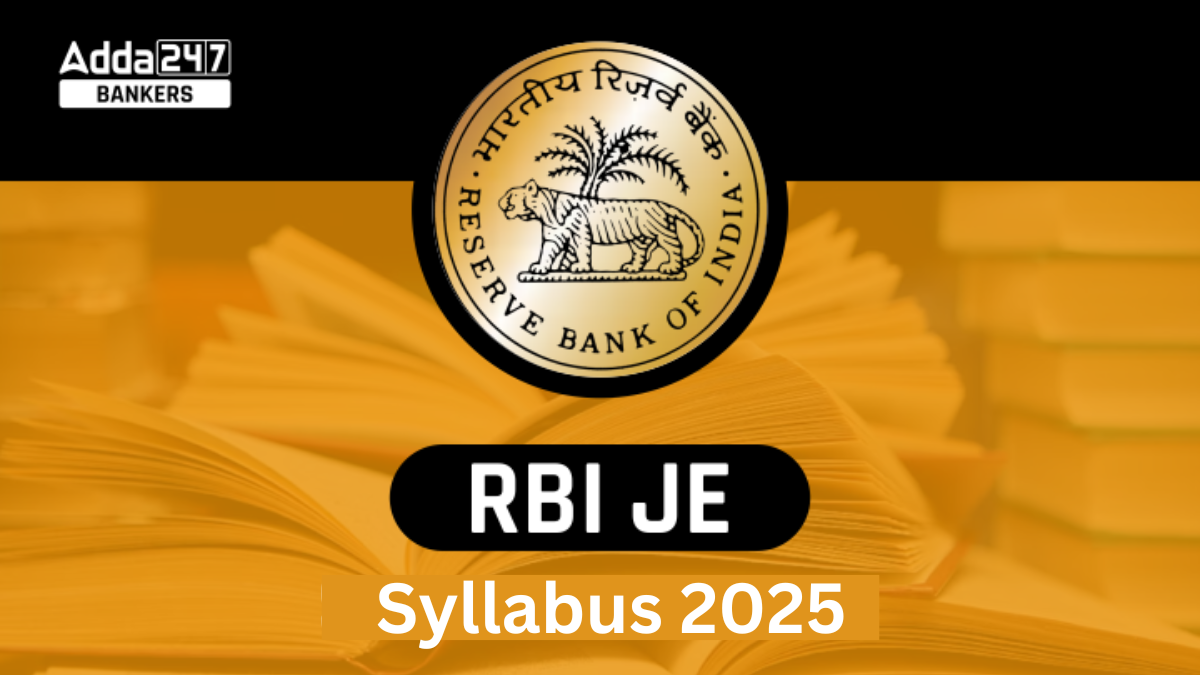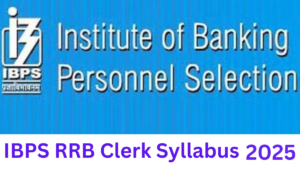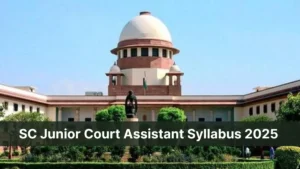Table of Contents
The Reserve Bank of India (RBI) has released the recruitment notification for 11 Junior Engineer (Civil/Electrical) posts. Aspirants aiming to apply must familiarize themselves with the RBI JE Syllabus and Exam Pattern to strategize their preparation effectively. Understanding the syllabus and exam pattern serves as a crucial roadmap, helping candidates plan their studies precisely. This article offers a detailed, topic-wise breakdown of the RBI JE Syllabus 2025, ensuring a comprehensive approach for successful preparation.
RBI JE Syllabus 2025 and Exam Pattern
The RBI JE Online Exam, scheduled for 8 February 2025, is a crucial step in the recruitment process for the Junior Engineer (Civil/Electrical) positions. Success in the exam requires a thorough understanding of the RBI JE Syllabus and Exam Pattern, which outline the structure of the test. The selection process includes an online examination, followed by a Language Proficiency Test (LPT). The RBI JE Exam Pattern provides candidates with key details such as the number of questions, maximum marks, and the time allocated for each section, enabling them to prepare effectively.
RBI JE Syllabus: Overview
Here in the given table, we have provided an overview of RBI Junior Engineer Syllabus 2025.
| RBI JE Syllabus: Overview | |
| Organization | Reserve Bank Of India |
| Exam Name | RBI JE 2025 |
| Post | Junior Engineer(Civil/Electrical) |
| Vacancy | 11 |
| Category | Syllabus |
| Selection Process | Online Examination, Language Proficiency Test |
| Mode Of Exam | Computer Based Test |
| Sections | English Language, Engineering Discipline Paper I, Engineering Discipline Paper II, General Intelligence & Reasoning |
| Number of Questions | 180 |
| Maximum Marks | 300 |
| Time Duration | 150 Minutes |
| Official Website | www.rbi.org.in |
| WhatsApp Official Channel | Join WhatsApp Channel |
| Telegram Official Channel | Join Telegram Channel |
RBI JE Exam Pattern 2025
The RBI JE Online Examination consists of four sections, and candidates must qualify for each section individually. The exam comprises 180 questions, carrying a total of 300 marks, with a time duration of 150 minutes. A penalty of 1/4th marks is applied for every incorrect answer. The table below provides a detailed overview of the exam structure.
Key Highlights of RBI JE Exam Pattern:
- Four Sections: Covers English Language, two Engineering Discipline Papers, and General Intelligence & Reasoning.
- Question Distribution: A total of 180 questions with varying weightage for each section.
- Time Allocation: Specific time limits for each section, summing up to 150 minutes.
- Negative Marking: 0.25 marks deducted for every wrong response.
| RBI JE Exam Pattern 2025 | ||||
| S. No. | Section | No. Of Questions | Maximum Marks | Time Duration |
| 1. | English Language | 50 | 50 | 40 Minutes |
| 2. | Engineering Discipline Paper I | 40 | 100 | 40 Minutes |
| 3. | Engineering Discipline Paper II | 40 | 100 | 40 Minutes |
| 4. | General Intelligence and Reasoning |
50 | 50 | 30 Minutes |
| Total | 180 | 300 | 150 Minutes | |
RBI JE Syllabus 2025 For Junior Engineer (Civil/Electrical)
The RBI Junior Engineer Syllabus 2025 for Civil and Electrical streams includes four key subjects: English Language, Engineering Discipline Paper I, Engineering Discipline Paper II, and General Intelligence & Reasoning. A detailed overview of the topics covered in each section is provided below to help candidates focus their preparation.
RBI JE Syllabus For English Language
The topics included in the RBI Junior Engineer Syllabus 2025 For English Language include the following topics.
- Grammar
- Vocabulary
- Synonyms and Antonyms
- Sentence Completion
- Reading Comprehension
- Fillers
- Cloze Test
- Error Detection
- Tenses
- Adjectives
- Adverbs
- Preposition
- Jumbled Paragraph
RBI JE Syllabus For Junior Engineer(Civil): Paper I
Candidates must be acquainted with the following topics for Paper 1 RBI JE Syllabus For Junior Engineer(Civil).
1. Building Materials: Properties, classification, and testing of materials like building stones, silicate-based materials, and Portland cement. Usage and production of materials such as asbestos, timber, laminates, bitumen, paints, and varnishes.
2. Estimating, Costing, and Valuation
Key topics: Earthwork, brickwork, RCC, timber, painting, flooring, plastering, boundary walls, septic tanks, and water tanks.
Techniques: Bar bending schedules, Centre Line Method, Mid-Section Formula, Trapezoidal Formula, and Simpson’s Rule.
Cost estimation: Septic tanks, flexible pavements, tube wells, steel trusses, pile foundations.
Valuation concepts: Scrap value, salvage value, sinking fund, depreciation, obsolescence, and valuation methods.
3. Surveying
Basics: Principles of surveying, distance measurement, and chain surveying.
Advanced techniques: Prismatic compass, compass traversing, theodolite adjustments, leveling, contouring, and tachometry.
Curve setting, earthwork calculations, and modern surveying equipment.
4. Soil Mechanics
Soil properties: Phase diagram, void ratio, porosity, unit weights, and density index.
Tests and classifications: Grain size distribution, Atterberg’s limits, ISI classification.
Advanced topics: Permeability, aquifers, consolidation, shear strength tests, soil compaction, and bearing capacity.
5. Hydraulics
Fundamentals: Fluid properties, hydrostatics, and flow measurements.
Applications: Bernoulli’s theorem, flow in pipes and open channels, weirs, spillways, pumps, and turbines.
6. Transportation Engineering
Highway design: Cross-sectional elements, geometric design, pavement types, and materials.
Pavement construction: WBM, WMM, bituminous and rigid pavement design, joints, drainage, and maintenance.
7. Environmental Engineering
Water management: Water quality, purification, and distribution systems.
Sewerage systems: Circular and oval sewers, appurtenances, and sewage treatment.
Pollution control: Solid waste management, air pollution causes and controls, and noise pollution mitigation.
RBI JE Syllabus 2025 For Junior Engineer(Civil): Paper II
The topics of Paper 2 covered under the RBI Junior Engineer(Civil) Syllabus 2025 are discussed below.
1. Theory of Structures
Elasticity Constants: Fundamentals of elasticity and their applications.
Beams: Types (determinate and indeterminate), bending moment, and shear force diagrams for simply supported, cantilever, and overhanging beams.
Moments: Moment of area and moment of inertia for rectangular, circular, tee, channel, and compound sections.
Structures: Analysis of chimneys, dams, retaining walls, eccentric loads, and slope deflection of beams.
Columns and Torsion: Critical loads, column design, and torsion in circular sections.
2. Concrete Technology
Concrete Basics: Properties, advantages, and uses of concrete, cement aggregates, and water quality importance.
Concrete Design: Water-cement ratio, workability, and mix design.
Processes: Storage, batching, mixing, placement, compaction, finishing, and curing of concrete.
Special Considerations: Hot and cold weather concreting, quality control, and maintenance of concrete structures.
3. RCC Design
Beam Design: Flexural strength, shear strength, bond strength, and design of singly and doubly reinforced beams.
Structural Components: Design of cantilever beams, T-beams, lintels, one-way and two-way slabs, and isolated footings.
Additional RCC Structures: Reinforced brickworks, columns, staircases, retaining walls, and water tanks.
Design Methods: Limit State and Working Stress methods.
4. Steel Design
Steel Structures: Design and construction of steel columns, beams, roof trusses, and plate girders.
RBI JE Syllabus 2025 For Junior Engineer(Electrical): Paper I
Here, we have described the topic-wise Paper 1 RBI JE Syllabus for Junior Engineer(Electrical).
- Basics of Electrical Engineering
- Lighting design of office areas
- Transformers, Working principles, protection types, preventive maintenance
- Pumping systems.
- Various type of motors, various starting methods of various types of motors
- Substation design and layout including DG set installations.
- Type of earthing, testing, lightening arrestor, etc.
RBI JE Syllabus For JE(Electrical): Paper II
Paper 2 of RBI JE(Electrical) Syllabus 2025 comprises the following topics listed down below.
- Basic ‘knowledge of’ air conditioning & refrigeration
- Inverters, rectifiers, UPS systems
- Energy conservation techniques
- LT distribution system, cabling/ internal wiring system, panel design and faultfinding, preventive maintenance, etc.
- Testing of electrical installation
- Basics of elevators, design, electrical safeties, protection controllers, etc.
- Basics of CCTV system. Fire and Smoke Alarm system, UPS.
- Knowledge of Indian Electricity Rules
- Switchgear & protection used in HT/LT installations.
RBI JE Syllabus For General Intelligence & Reasoning
The topics asked in the General Intelligence & Reasoning Syllabus for RBI JE are as follows.
- Blood Relation
- Coding-Decoding
- Syllogism
- Clock & Calendar
- Directions
- Non-Verbal Series
- Analogy
- Number Ranking
- Decision Making
- Statements & Arguments
- Data Interpretation
- Puzzle
- Seating Arrangement
- Alphabet Series
- Arithmetical Reasoning




 IBPS RRB Clerk Syllabus 2025 and Exam Pa...
IBPS RRB Clerk Syllabus 2025 and Exam Pa...
 AIC Management Trainee Syllabus and Exam...
AIC Management Trainee Syllabus and Exam...
 Supreme Court Junior Court Assistant Syl...
Supreme Court Junior Court Assistant Syl...







